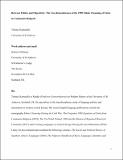Files in this item
Between politics and objectivity : the non-remembrance of the 1989 ethnic cleansing of Turks in communist Bulgaria
Item metadata
| dc.contributor.author | Kamusella, Tomasz | |
| dc.date.accessioned | 2021-08-13T23:39:24Z | |
| dc.date.available | 2021-08-13T23:39:24Z | |
| dc.date.issued | 2020-02-14 | |
| dc.identifier | 266528903 | |
| dc.identifier | 16f5dfe8-b76d-446c-b648-c3b5e99fda54 | |
| dc.identifier | 000515364000001 | |
| dc.identifier | 85092507081 | |
| dc.identifier.citation | Kamusella , T 2020 , ' Between politics and objectivity : the non -remembrance of the 1989 ethnic cleansing of Turks in communist Bulgaria ' , Journal of Genocide Research , vol. Latest Articles . https://doi.org/10.1080/14623528.2020.1726649 | en |
| dc.identifier.issn | 1462-3528 | |
| dc.identifier.other | ORCID: /0000-0003-3484-8352/work/69835230 | |
| dc.identifier.uri | https://hdl.handle.net/10023/23778 | |
| dc.description.abstract | Cold War Europe’s largest and most intensive act of ethnic cleansing, namely, the 1989 expulsion of Turks from communist Bulgaria, remains a neglected subject three decades on after the event. When it took place, the term “ethnic cleansing” had not been invented yet, so in light of international law this expulsion was a “population transfer.” Population transfers (even unilateral) were deemed legal until the mid-1990s. Subsequently, under the influence of the atrocities committed during the wars of Yugoslav succession, population transfers were criminalized and relabelled as “ethnic cleansings.” For a variety of reasons, the 1989 Ethnic Cleansing has been also neglected by scholars and politicians in both, Bulgaria and Turkey. The neglect continues to this day, despite the Bulgarian Parliament’s momentous 2012 Declaration, which officially recognized the expulsion as an act of ethnic cleansing. This Declaration – which could become a basis for successful Turkish-Bulgarian reconciliation – largely remains unknown in both countries, while the propagandistic terminology employed for referring to the 1989 Ethnic Cleansing deepens the oblivion and obfuscates the nature of this tragic event. Both, in Turkish and Bulgarian, official and scholarly terminology employed suggests – incorrectly – that it was a “kind of emigration.” | |
| dc.format.extent | 19 | |
| dc.format.extent | 504328 | |
| dc.language.iso | eng | |
| dc.relation.ispartof | Journal of Genocide Research | en |
| dc.subject | 1989 Ethnic cleanisng | en |
| dc.subject | Bulgaria | en |
| dc.subject | Bulgarian Turks | en |
| dc.subject | Bulgarian Muslims | en |
| dc.subject | Expulsion | en |
| dc.subject | Terminology | en |
| dc.subject | Turkey | en |
| dc.subject | DK Russia. Soviet Union. Former Soviet Republics | en |
| dc.subject | DJK Eastern Europe | en |
| dc.subject | DS Asia | en |
| dc.subject | T-NDAS | en |
| dc.subject | SDG 10 - Reduced Inequalities | en |
| dc.subject.lcc | DK | en |
| dc.subject.lcc | DJK | en |
| dc.subject.lcc | DS | en |
| dc.title | Between politics and objectivity : the non-remembrance of the 1989 ethnic cleansing of Turks in communist Bulgaria | en |
| dc.type | Journal article | en |
| dc.contributor.institution | University of St Andrews. School of History | en |
| dc.contributor.institution | University of St Andrews. St Andrews Institute for Transnational & Spatial History | en |
| dc.identifier.doi | 10.1080/14623528.2020.1726649 | |
| dc.description.status | Peer reviewed | en |
| dc.date.embargoedUntil | 2021-08-14 |
This item appears in the following Collection(s)
Items in the St Andrews Research Repository are protected by copyright, with all rights reserved, unless otherwise indicated.

